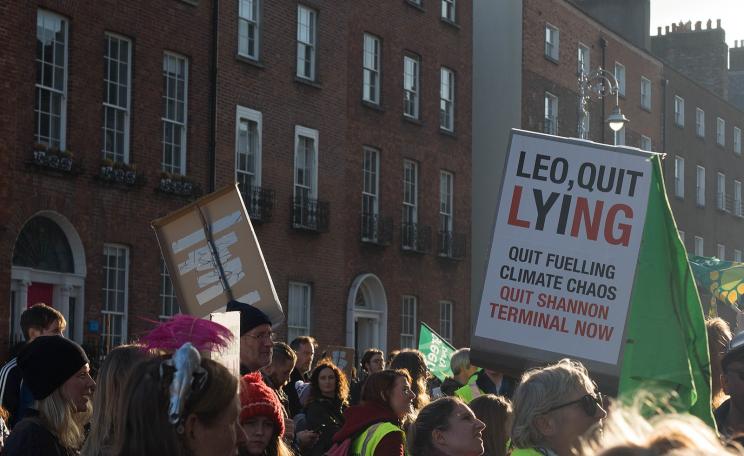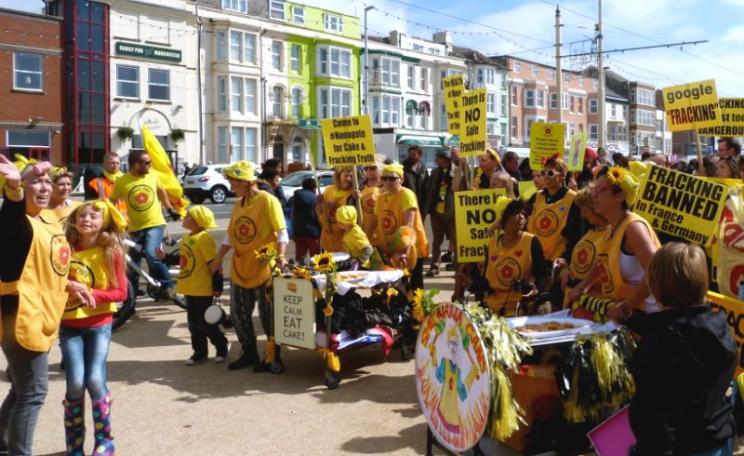It's toxic as hell, it would kill you if you drank any quantity of it, it will kill birds, it will kill cattle. So this is poisonous stuff.
Hydraulic fracturing, known as fracking, for the production of gas is the subject of fierce debate in America, Britain, South Africa and countries around the world, with green activists warning that it degrades land and pollutes air and water.
Yet for more than a decade, Botswana, lauded as one of Africa's most stable democracies, has been quietly granting lucrative licences to international companies to carry out fracking in the fragile Central Kalahari Game Reserve (CKGR).
Some observers believe this is the most likely reason for President Ian Khama's government fighting court battles to prevent the Kalahari Bushmen, also known as the San, from returning to their ancestral land. The government denies this and says the prospecting under way should not be defined as fracking.
Keikabile Mogodu, an advocate for San rights, said: "We have heard nothing. We are in the dark. If fracking is done in the areas where people are, consultations should be done. The companies should talk to the people but nothing has been done. We are trying to follow it up with the ministry because fracking is dangerous and is going to destroy the balance of the ecosystem - it should be a debate in the media."
The CKGR is the second biggest wildlife reserve in the world, spanning 52,800 sq km. Energy companies that have raced for a share in recent years include the Australian-based Tamboran Resources and Debswana, a joint venture between the government and the diamond company De Beers.
The Bushmen said they had no idea their areas had been earmarked for drilling until they were shown a map during the making of a new documentary film, The High Cost Of Cheap Gas, revealing that half the game reserve has been allocated to multinationals. Seranne Junner, a lawyer who successfully defended the Bushmen's right to occupy their traditional lands within the CKGR, expressed surprise at the extent of land concessions:
"I personally do not know of any or much public awareness on this aspect within Botswana at least. I know there's quite a lot of public awareness relating to the fracking that's ongoing or that is trying to be implemented in the Karoo area in South Africa but as for Botswana, I would be interested to know how many of our population on the ground is aware - and government departments themselves are aware - of the consequences of these ongoing activities."
She warned: "These licences may have been granted without anybody realising the long-term consequences. Water is not a resource that is overly abundant in Botswana as a whole, more especially within an area such as the CKGR. I would say it's going to be extremely far-reaching for a sector of our population, if not the whole country."
It's toxic as hell, it would kill you if you drank any quantity of it, it will kill birds, it will kill cattle. So this is poisonous stuff.
The Kalahari's ecosystem is at particular risk because it contains coal bed methane, which requires water to be pumped out of the ground. This increases the danger of pollution and lowering the water table, potentially by hundreds of feet, which could cost a community its access to water - already a scarce resource in Botswana.
Some 30,000-60,000 elephants range through the north of the country, the biggest population of elephants left in Africa, and they are dependent upon water drawn from the ground from boreholes. Ben Moeler, a farmer near Nata, expressed concern that the boreholes could become contaminated by gas prospecting.
"Here in this area these elephants bank on those boreholes. From us throughout to Chobe it'll be a huge, huge disaster for the area. I just hope it never happens in my life."
The waste water pulled out of the coal seam during fracking is potentially lethal to humans and animals. In an interview before his death earlier this year, Randy Udall, an American energy analyst, said:
"They call it produced water - you can just as easily call it poisoned water. It's toxic as hell, it would kill you if you drank any quantity of it, it will kill birds, it will kill cattle. So this is poisonous stuff."
One of the companies operating in Botswana revealed that environmental regulations are not being followed. Steve Boden, unconventional gas development manager of South African energy giant Sasol, said: "We weren't required to do an environmental management plan for it but in our opinion it's best practice that we do."
The dewatering of a coal seam during fracking has the potential to lower the water table, Boden admitted. "It's a dry, semi-arid environment and they [the local community] are quite reliant on that water, so we have to be cognisant of those things."
Yet Sasol has significant ambitions in Botswana. "In terms of a coal bed methane commercial development on a large scale, you know you're looking at thousands of gas wells. Obviously through the life of a project not all of those will be operating so you may have over, I don't know, a 3,000 km area where you might be running 2,500 gas wells at any one time."
Despite the scale of the plans, a lack of publicity and media scrutiny has enabled the government to forge ahead unchecked. Dr Benson Modie, who drafted the first official report on natural gas development in Botswana and oversaw the drilling of the first exploration wells, conceded: "There has always been that possibility that we are going to pollute the environment."
Asked if the CKGR's ecosystem, which has supported communities for centuries, is a price worth paying for natural gas from fracking, Modie replied:
"If you have country like this and the population is growing and you have a government that has to make decisions for all people of that country, some decisions like that will be made."
But the government, often hailed as a beacon of democracy in southern Africa, disputed the definition of fracking. Its spokesman, Jeff Ramsay, said:
"There is currently no fracking in the CKGR or anywhere else in the country. Coal bed methane is being prospected in the country, though there are no current commercial operations. Still not clear whether commercially viable or not, though a number of companies have shown interest."
He added: "Coal bed methane prospecting in the country is being carried out by drilling, not fracking. Environmental impact assessments and management plans are a legal requirement for all mining in our country.
"Any future proposal for a licence for commercial fracking in this country would certainly be subject to vigorous debate, whether in a game reserve or anywhere else."
Drillers interviewed on site in Botswana specifically referred to their operations as "fracking" and vehicles and equipment typically used for fracking could be seen.
Richard Lee, communications manager at the Open Society Initiative for Southern Africa, said:
"This encapsulates everything that is wrong with natural resource extraction in southern Africa - the secrecy, the lack of consultation with affected communities, the weak regulatory systems, and the elite collusion between governments and companies at the expense of the people.
"The Batswana have the right to know about developments on this scale and to decide whether they are in their best interest. Instead, the authorities keep everyone in the dark, particularly the San, who now face another grave threat to their future from Botswana's secret dash for gas."
This article was first published by The Guardian under the title Botswana faces questions over licences for fracking companies in Kalahari. Reproduced here with thanks via the Guardian Environment Network.
Photo with thanks to Shutterstock.
| READ MORE... | |
 |
COMMENT Fracking - it's the water, stupid! Not only is fracking a massive threat to the UK's water, argues John Ward - it's a dead-end technology that will make us pay a heavy price for going precisely nowhere in energy terms. |
 |
NEWS ANALYSIS New Brunswick fracking protests are the frontline of a democratic fight Images of burning cars and narratives about Canadian natives breaking the law obscure the real story about the Mi'kmaq people's opposition to shale gas exploration writes Martin Lukacs.... |
 |
NEWS ANALYSIS Exclusive Oil giant Halliburton lined up as potential UK fracking partner Deepwater Horizon disaster firm hold talks with company planning to drill for oil and gas in South Downs National Park. Andrew Wasley reports |
 |
NEWS ANALYSIS ANTI FRACKING SPECIAL REPORT: UK The UK's Fracking Protests Are Working says Jan Goodey who has been reporting for the Ecologist from Balcombe since the first of the protestors turned up to stop the drills |
 |
NEWS ANALYSIS Special report Dairy farms suffer in US shale gas fracking boom The dash for unconventional gas may have brought financial benefits to some, but for struggling dairy farmers in Bradford County, Pennsylvania, the arrival of drilling wells could be the final nail in the coffin. Dimiter Kenarov reports |





